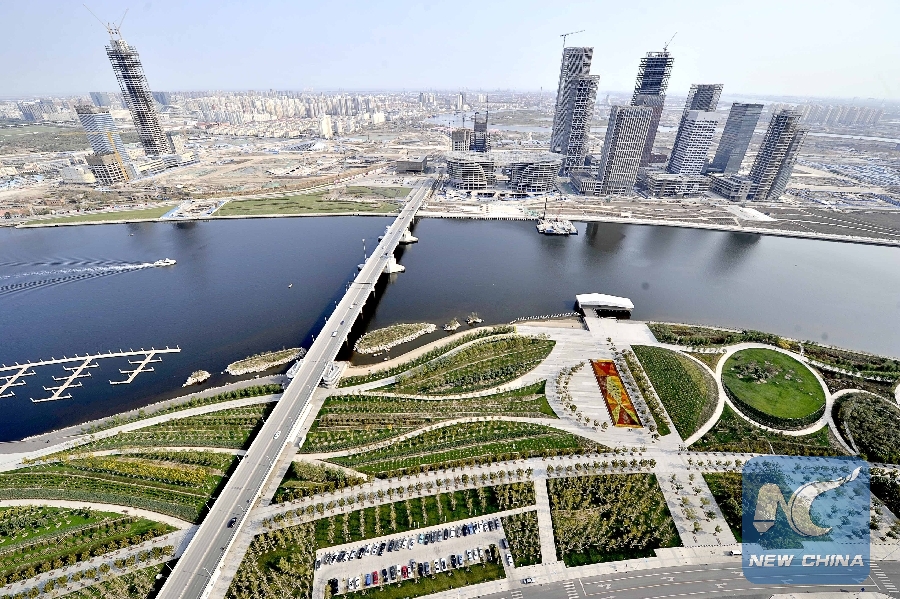
File photo taken on Nov. 7, 2014 shows the landscape of Yujiapu Finance District at Binhai New Area of the China (Tianjin) Pilot Free Trade Zone (FTZ) in north China's Tianjin Municipality. (Xinhua/Yue Yuewei)
NEW YORK, Jan. 10 (Xinhua) -- There will be more opportunities for foreign firms to invest in China in 2019, considering the Asian country's efforts to create a more favorable environment for global business.
"China will certainly create a favorable environment for the business community," Lin Yifu, director of Center for New Structural Economics, said during a yearly event held here Thursday under the theme "Forecast of China's Economy for 2019."
Lin added that China is set to expand more pilot free trade zones.
"That means there will be more opportunities for the foreign firm to make investments in China, and the Chinese government will encourage that," added Lin, also a professor and honorary dean of the National School of Development at Peking University.
Global automakers, led by Germany's Volkswagen AG, are planning a remarkable increase of 300 billion U.S. dollars in spending for planned EV investment and procurement over the next five to 10 years, with nearly half of the money targeted at China, according to Reuters on Thursday.
Panelists at the event also said that investment opportunities will grow especially in technology innovation because of China's focus on technology-related investment and its growing middle class, according to Huang Haizhou, managing director of China International Capital Corporation, who was also a panelist at the event.
"As China continues to grow, China will need to invest more in technology. China welcomes international companies to invest in China or move their headquarters to China," Huang told Xinhua during the discussion.
Besides technology, consumption, healthcare and education are also hot choices for foreign investors, Huang added.
"Given the size of China's population, the middle class will become the largest in the world," he said. "In that regard, China is definitely shifting more into consumption, healthcare, education and anything related to that area with high and increasing demand going forward."
U.S. EV giant Tesla has already broken ground in China, as it confirmed in its third quarter financial report in October that it would bring "portions of Model 3 production" to China, now the world's largest vehicle market.
Tesla's decision came following an agreement with the Shanghai municipal government in July 2018 to build its Gigafactory, an electric vehicle manufacturing facility, which is currently under construction as one of the largest foreign-invested manufacturing projects in Shanghai.
China clearly has advantages in promoting EV production thanks to its continuous efforts to battle environmental pollution, said Albert Keidel, an adjunct graduate professor of Economics Department at George Washington University told Xinhua.
"It's not a surprise that the world's automotive industry makers want to move their EV industries there," said Keidel. "That's quite a natural move."
Lin said that the Chinese government would expand its fiscal stimulus to support investments in the environment, infrastructure and urbanization-related property in 2019, which would also inject steam into the EV industry.
Lin also predicted that China would maintain a growth rate of around 6.5 percent and remained confident about the prospect for China's growth in 2019.
On the environment front, although China's economy has met some troubles, "it actually improves environmental outcomes, because there are fewer factories pumping smoke in the air," said Daniel Rosen, a founding partner of the New York-based research consultancy and advisory company Rhodium Group.
"To keep the country out of a dead end, China is making progress in terms of innovation, reducing some of the air pollution and water pollution problems," Rosen said during the event.
He added that there's a potential to see trillions of dollars of Chinese savings and investment come out into the world in portfolio investment and direct investment by companies, with foreign investment and savings heading toward China in the future.
The yearly event was jointly held by the National Committee of U.S.-China Relations and China Center for Economic Research of Peking University.

